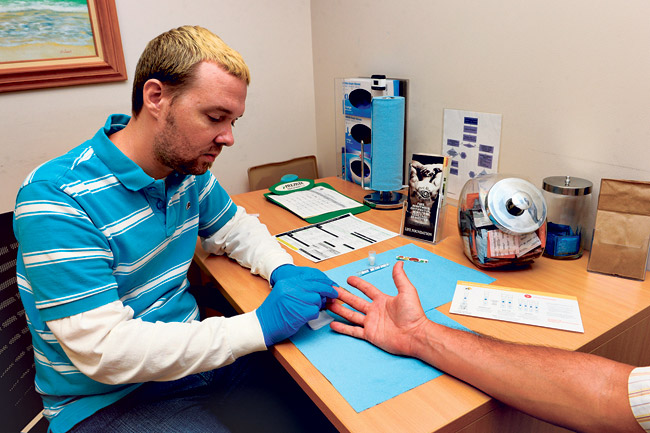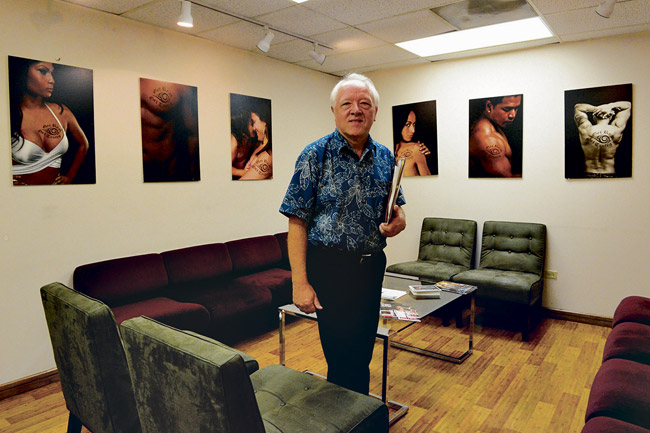An Unlikely Leader In The AIDS Fight
Paul Groesbeck wasn’t what the Life Foundation was looking for 20 years ago – for starters, he’s straight – but he was exactly the right guy
The fervor and clamor over the AIDS epidemic has changed a lot over the past two decades. What was once on the cover of Newsweek more than a dozen times is now relegated to a smattering of red ribbons worn earlier this month that many of us mistook for symbols of support for MADD.
The disease that in the mid-1990s was the No. 1 killer of people 25-44 years of age, surpassing even cancer and accidental deaths, has had its mortality rate slashed like AIG stock by a staggering 700 percent thanks to HAART – or as it is more widely known, the AIDS cocktail. While it does not cure the disease, it has allowed those stricken by it to continue long, productive lives.
But the disease has not gone away, and there are 4,200 diagnosed cases of AIDS in the state of Hawaii today with just fewer than 1,000 new cases being discovered every year.
During this tumultuous and positively trending time, there has been one man at the helm of Life Foundation, Hawaii’s largest provider of aid to those suffering from the infection – Paul Groesbeck. When he joined the organization in 1992, it had 306 clients, of which 100 died within the year. This year, of the 715 it’s helped, only 15 have succumbed to the disease.
He was as unlikely a man to find at the forefront of the fight against AIDS in Hawaii as the man who became the national face of the disease around the same time, Magic Johnson. When the very heterosexual NBA star announced his infection in 1991, he changed the paradigm of how we thought of the “gay disease” and whom it would affect.
The same could be said for Groesbeck. He didn’t match any of the hiring committee’s preconceived criteria when looking for someone to lead its organization. For starters, he was a straight, married man with a law degree from Boston, who specialized in the civil rights of the poor.
“Although he was not who we were expecting,” says Dr. David McEwan, who led the hiring committee along with Hula’s Bar and Lei Stand owner Jack Law, “it seemed as though he was expecting us. He was calm, peaceful, and unthreatened by the huge task we were putting before him.
“He was principled, and the type of man who put those principles into action. We left the interview feeling impressed and grateful that he would consider the position. Life Foundation was, and remains, near and dear to our hearts, and we would never entrust it to someone we didn’t truly believe in.”
Groesbeck had been applying for law positions at the time he answered the ad, and while this did not fit exactly into what he had done for half his life, he saw a place where he could help.
“I had always worked in civil rights, and they were looking for the same thing we are all looking for: a level playing field,” says Groesbeck.
Life Foundation, which was founded in 1983, is different than many nonprofits dedicated to diseases in that it is in no way associated with searching for a cure for AIDS, but rather assists those who already have been infected and works to prevent the spread of HIV to those who have not.
The prevention end of its work comes through education and testing. They speak to schools, churches and social groups about not just the dangers of the disease, but how they can keep themselves safe. Unfortunately, schools will not allow Life Foundation to distribute the materials that would help keep kids safer.
“None of the schools in Hawaii is allowed to distribute condoms – there are arguments on both sides of it,” says Groesbeck, who is a father of five and grandfather of four. “As a parent, you want them to wait, but clearly that can’t always be the case. If young people are going to be sexually active, we should try to arm them with as much information as possible and indicate to them where they can get safe-sex materials.”
This is not to say that Groesbeck wants to see a big candy bowl full of condoms at the front door of every school, but the connection between giving kids access to protection and an outbreak in sexual experimentation holds no water for him.
“The argument that if you distribute condoms it will make kids want to have sex more is the same one the car manufacturers used to make about why they couldn’t put seatbelts in cars because then people will think that cars are unsafe,” says Groesbeck. “Both arguments make no sense. We are not here to encourage them to have sex, but keeping them safe is the important thing.”
For anyone who would like to take a test, Life Foundation provides complimentary and anonymous testing at its facility at 677 Ala Moana Blvd., and it uses the new Rapid HIV test so that what once took weeks to get a result now can be known in less than 15 minutes.
For those who are found positive, Life Foundation provides caseworkers to assist them in the process of getting to the right physicians. Currently, it assists more than 700 HIV-positive patients, all at no cost to the client.
This assistance is so important because of the stigma still attached to the disease, says Groesbeck. The foundation has found that some people would rather keep it a secret until it is too late because of the shame they feel over the disease.
He realizes – because it is a primarily sexually transmitted disease – that it will always be out of the mainstream in most people’s minds, but he wants to make sure that people know Life Foundation is there to get those infected through this dreadful, but now not necessarily deadly infection.
“We try not to be too judgmental,” says Groesbeck. “We want people to be safe, and we don’t think people should have to pay the ultimate sacrifice just for having sex.”







